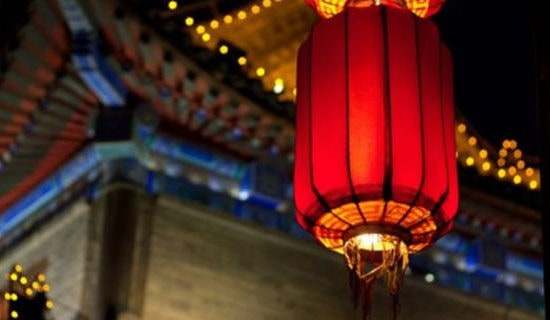春节由来故事的英文介绍
大家知道春节的由来以及故事吗?下面是由应届毕业生小编为大家带来的关于春节由来故事的英文介绍,希望能够帮到您!

春节由来故事的英文介绍
The Origin of Chinese New Year The Chinese New Year is now popularly known as the SpringFestival because it starts from the Begining of Spring (the first of the twenty-four terms incoodination with the changes of Nature)。 Its origin is too old to be traced. Severalexplanations are hanging around. All agree, however, that the word Nian, which in modernChinese solely means year, was originally the name of a monster beast that started to prey onpeople the night before the beginning of a new year.
One legend goes that the beast Nian had a very big mouth that would swallow a great manypeople with one bite. People were very scared. One day, an old man came to their rescue,offering to subdue Nian. To Nian he said, I hear say that you are very capable, but can youswallow the other beasts of prey on earth instead of people who are by no means of yourworthy opponents? So, it did swallow many of the beasts of prey on earth that alsoharrassed people and their domestic animals from time to time.
After that, the old man disappeared riding the beast Nian. He turned out to be an immortalgod. Now that Nian is gone and other beasts of prey are also scared into forests, peoplebegin to enjoy their peaceful life. Before the old man left, he had told people to put up redpaper decorations on their windows and doors at each year's end to scare away Nian in case itsneaked back again, because red is the color the beast feared the most.
From then on, the tradition of observing the conquest of Nian is carried on from generation togeneration. The term Guo Nian, which may mean Survive the Nian becomes today Celebratethe (New) Year as the word guo in Chinese having both the meaning of pass-over andobserve. The custom of putting up red paper and firing fire-crackers to scare away Nian shouldit have a chance to run loose is still around. However, people today have long forgotten whythey are doing all this, except that they feel the color and the sound add to the excitement ofthe celebration.
【拓展阅读】
春节的来历
有一年,世上大乱。玉帝得知后,降下御旨:要派一位大神去管理人间的衣食住行。可是,没有神仙肯接旨。
这时候,南天门外传来一声吆喝:“这差事我干啦!”抬头看时,是光头顶、胖乎乎、笑哈哈的弥勒佛。 却说这弥勒佛来到人间,第一件事就是让人们过一个痛快年,吃好的,穿好的,不干活。他还要大家把各路神仙都请到,香箔纸锞,准备齐全。到了初一,家家都要起五更,放鞭炮。
这样又过了几天,到了初五,天刚蒙蒙亮,忽然传来一阵吵闹声。吵闹者是姜太公的老婆(专管茅房、粪土的脏神),正在跟弥勒佛吵架呢。原来,人们请神仙时把她给忘了。弥勒佛只好说:“这样吧!今儿是初五,让人们再为你放几个炮,包一次饺子,破费一次吧!”——这就是“破五”的`来历。
不想这几声炮响传到天宫,玉帝以为人间又出了什么事,便派财神去察看。财神来到人间一看,到处都是香箔纸锞,高兴得就忘了回去。
玉帝等啊等,财神还是没有回来,便亲自到人间察看。他一看,人们啥活都不干,非常生气,召来弥勒佛喝道:“你怎么尽让人们吃好的,穿好的,不干活?”
弥勒佛笑嘻嘻地说:“你要我管人们的衣食住行,可并没有叫我让人们干活呀!”玉帝一想,也对,既然已经这么办了,那一年只能有此一次,开春以后就要下地干活。
从那以后便留下了旧例,一年有一次春节。
“二十三,祭罢灶,小孩拍手哈哈笑。再过五六天,大年就来到。辟邪盒,耍核桃,滴滴点点两声炮。五子登科乒乓响,起火升得比天高。”你知道人们为啥要过小年吗?
过小年的来历
有个叫阴子方的人,心地善良,却家境贫寒。有一年,大雪下了十几天,眼看春节将至,他却没钱办年货,只能望着大雪发呆。
腊月二十三日,灶神装作一个讨饭的老太婆来到阴子方家门口,求他给点饭吃。可阴子方哪有吃的?自己已经两天没有吃东西了。老太婆很生气,说:“你真没良心,我一个孤老太婆大雪天来要饭,你却啥也不给……”说着,就栽到了雪地里。
阴子方赶紧将她扶进屋里,急得不行,只得狠狠心把家里的小狗杀掉了。可等他做好狗肉,老太婆却不见了。桌上留下个包袱,里面是闪闪发光的金子,还有几行字:“我本灶神君,要饭知你心;狗肉我不吃,算作过年羹。赐金一两整,买地和娶亲。”
后来,阴子方买了地和牛,精心耕作,终于过上了好日子。
这事愈传愈远,每到腊月二十三,人们纷纷祭祀灶君,开始“过小年”。
饺子的来历
“初一饺子初二面,初三合子往家转,初四烙饼炒鸡蛋。初五初六捏面团,初七初八炸年糕,初九初十白米饭,十一十二八宝粥,十三十四汆汤丸,正月十五元宵圆。”你知道这些春节美食的来历吗?
从前,有位秀才日夜苦读,常常读得不知睡觉、忘了吃饭。
妻子王秀姣很为他担心,一天,她特意给丈夫炖了香喷喷的鸡肉,可秀才仍然边吃边读,一不留神,一小块鸡骨头卡在嗓子眼里,害得他吭吭咳咳了好一阵。秀才摇了摇头,连连说:“惜乎哉!惜乎哉!误了好时光。”
怎样才能既不费事又能好吃呢?妻子琢磨开了,吃面片吧,省事却没营养;吃肉吧,又太腻口。她突然想到了用面片包肉,立即去做。第一次,包的是肉末,味道不太好;第二次,包肉末和菜,味道不到家;第三次,包上了味料的肉末和菜,味道好极了!
秀才一尝,也觉得清香可口,连连称赞:“真好吃,真好吃也。”
秀才由于吃好了,精力逐渐旺盛,进京赶考后,中了个状元。喜讯传来,有人问秀才读书的秘诀,秀才说:“吃得好,吃得好。”随后,把自己每天吃饭的经过跟众人说了。
众人迷惑了,我们咋没吃过?连忙问他那东西叫什么名字。秀才一想,东西是贤妻做的,就叫它“姣子”吧。
大家听说吃“姣子”能中状元,都来学着做,慢慢的,“姣子”被改名为“饺子”。
【春节由来故事的英文介绍】相关文章:
感恩节由来的英文介绍10-01
感恩节的由来英文介绍10-01
感恩节由来英文介绍10-01
感恩节的由来简介英文介绍10-02
美国感恩节的由来英文介绍10-02
感恩节火鸡的由来英文介绍10-02
感恩节的由来英文简短介绍10-02
春节的英文介绍作文3篇02-22
英文解说成语南辕北辙的由来08-19
感恩节的由来英文10-02